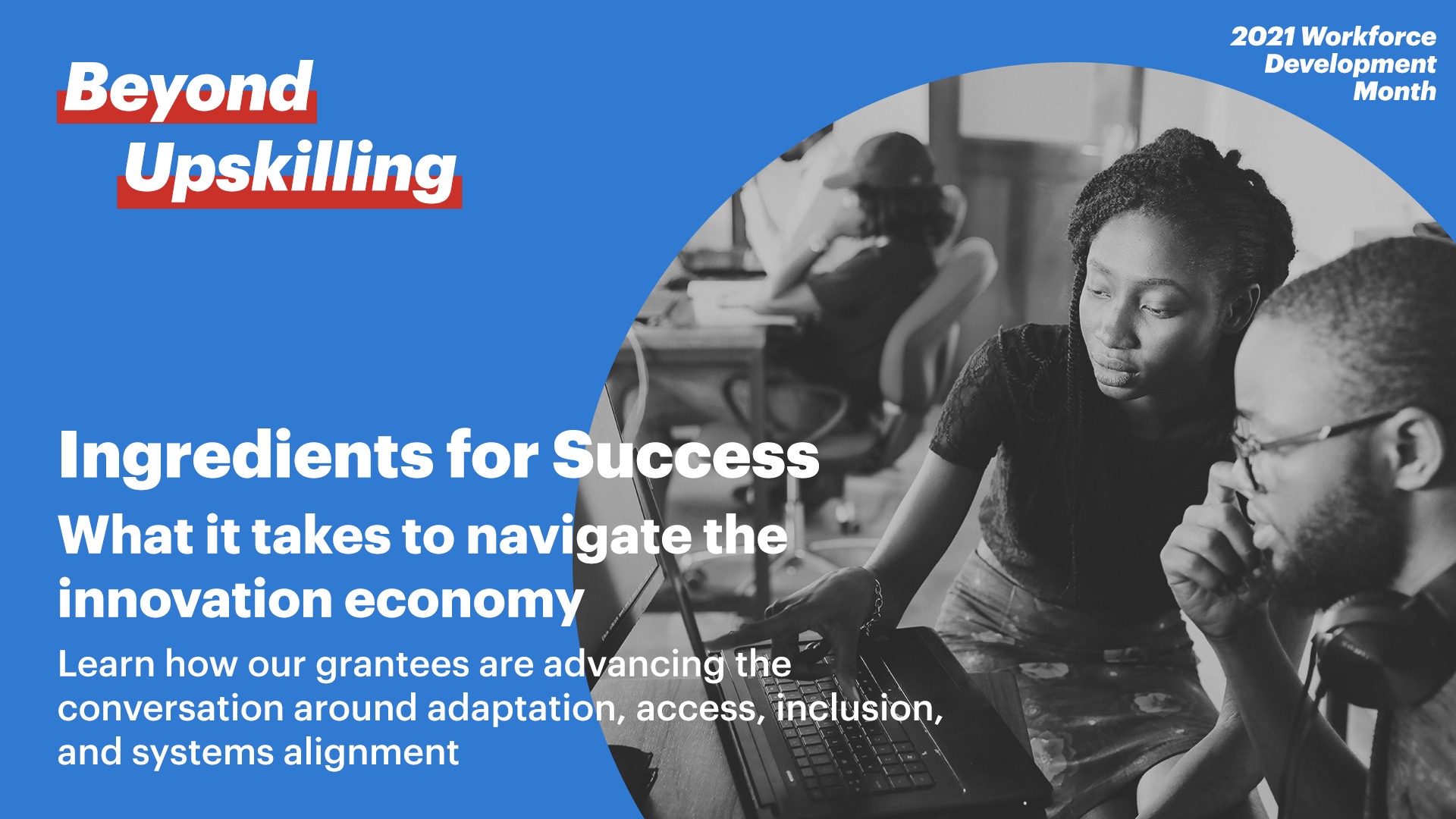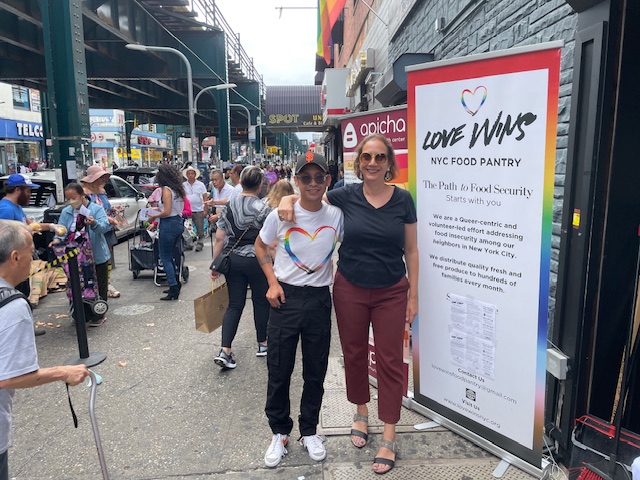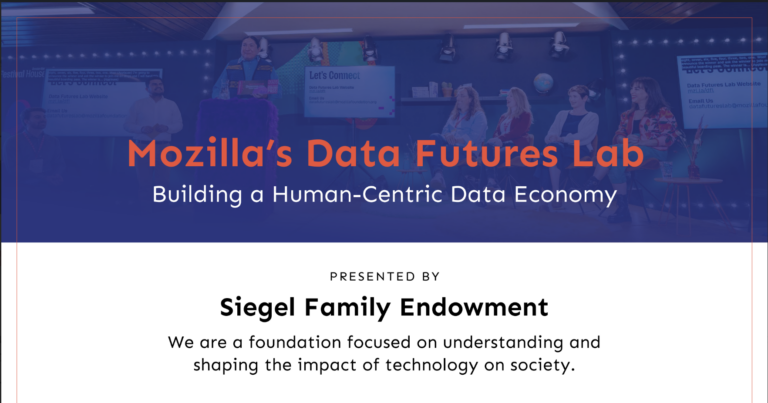
As the innovation economy continues to evolve and exert new demands on people’s time, skills, and education, creating a more adaptable and inclusive workforce is becoming increasingly urgent. Siegel Family Endowment’s grantees have significantly advanced the conversation around career adaptability, transferable skills, job quality, meaningful credentials, and employment. Throughout September, Workforce Development Month, we’ll examine the work they’re doing to create supportive career systems, and to rethink training, access, and cross-sector collaboration. In this second article in SFE’s ‘Beyond Upskilling’ series, we’ll explore some of the new conditions and tools that individuals can use to participate more effectively in the innovation economy.
The innovation economy relies heavily on new and emerging skill sets that have rapidly upended traditional credentialing systems, employer needs, and almost every field and type of work. While the rewards for participating in the innovation economy on these new terms are often high, there’s limited consensus on how people can engage most effectively. A few things are clear, though: adaptability, resilience, and key social infrastructure all play major roles in helping someone to succeed in this constantly-evolving economic landscape.
One of SFE’s major objectives is to ensure that individuals have more than just a series of currently in-demand skills and literacies; we want to make sure that those skills are augmented with persistent learning, growth mindsets, and robust networks of support. To that end, the grants in our Workforce portfolio prioritize organizations that focus on both skill sets and mindsets, and that prepare individuals for multifaceted and agile long term careers.
As we work on defining the kinds of skills and talents that employers and job seekers alike should pursue to effectively participate in the innovation economy, SFE’s grantees are asking similar questions in their own work: What kinds of labor, mindsets, and skillsets should individuals pursue in order to remain adaptable, employable, and resilient in the face of ongoing, rapid change? What kinds of resources already exist, and how can individuals take advantage of them in order to strengthen their own positions in these areas? What additional supports and structures are needed?
Below, we’ll take a look at some key factors and considerations for navigating the innovation economy by examining the work of SFE grantees who are doing important work in this space.
Adaptability
COOP Careers has built its model on skills adaptability, and emphasizes the power of social connections to improve career resiliency and long term prospects for advancement. COOP focuses their services exclusively on college graduates who are underemployed, but who have a solid foundation and capacity for meaningful work with ample room for advancement. The program supplements skills acquired during undergraduate study with skills suitable for locally in-demand roles in the digital economy, beyond the typical purview of coding and software engineering in areas like digital marketing, tech sales, and data analytics. This approach acknowledges that there’s no one-size-fits-all entry point to the innovation economy, and that popular but high-investment skillsets like coding are often duplicative of existing skills while creating an undue burden or simply being a poor fit for many job seekers. Instead, COOP’s work is grounded in the idea that the digital economy contains a multitude of different roles and job types that are a better fit for a wider range of job seekers.
By taking a wider view of the digital economy, and the wide range of different professional opportunities that it can offer to job seekers, COOP is working to improve participants’ capacity to pursue successful long term careers, and to perform the kind of work that feels like the best individual fit. Read more about their work in our recent spotlight interview with COOP’s Founder and CEO, Kalani Leifer.
Access and Inclusion
An important part of improving the employment ecosystem is expanding access to the innovation economy for all people. SFE grantee ICA addresses this issue by investing in high-growth small businesses in order to create high-quality jobs that can function as the foundation for building communities that are equitable for all.
In a recent ED Q&A, ICA’s CEO Allison Kelly explained the organization’s strategy for investing in and accelerating local, value-driven businesses that are led by – and make good jobs available for – women and people of color. “Our financial system was not set up to be inclusive and has therefore deemed opportunities outside of the traditional credit boxes as ‘risky,’” said Kelly. “We see them as an opportunity, and are excited and proud to make these investments.” ICA is committed to funding entrepreneurs who are often overlooked by mainstream funders, and providing them access to flexible capital and mentoring. In doing so, they create the conditions for work that forge more pathways to engagement and participation, and ultimately address deeper systemic flaws, like the race and gender wealth gaps.
Modern Credentials
SFE grantee Merit America starts from a place of acknowledging that the traditional criteria that so many employers rely on to make hiring decisions, like college degrees, represent a flawed starting point that can act as a barrier to entry for a significant population of job seekers. Hiring based on credentials instead of skills complicates the process of creating an appropriately skilled workforce by excluding a significant portion of the job-seeking population from competitive roles without taking their practical skillsets into consideration. Focusing on degrees instead of skills has created barriers for an estimated 30 million American workers who may already have the relevant tools to perform in open and existing roles, but remain in low-wage, low-growth jobs because of exclusionary degree requirements.
Instead, Merit aims to put the control back in the hands of their program participants, and challenges common misconceptions about degree requirements and education discrimination. While much of the skills and employability conversation is focused on preparing job-seekers for high-investment roles in coding, programming, or engineering, Merit’s work connects participants with mobility-driven career paths focused on complementary roles. “We’ve developed lists of priority careers that offer high quality jobs, and offer significant growth potential in professional services and information technology,” said Connor Diemand-Yauman, Founder and Executive Director of Merit America in an ED Q&A this past March. “These include user and network support specialists, data analysts and administrators, human resources specialists, logisticians, and more.”
By focusing on a broader sector of the job market that is primed for sustainable and adaptable long term growth, Merit is able to provide their program participants with skillsets that apply in any number of different fields, and aren’t limited by a specific field or type of position. The innovation economy needs to work for all people, and incorporate members of all communities if it’s going to truly thrive and be positioned for sustainable, long term growth. Organizations that recognize this fact and center access as a part of their work are critical to achieving this goal.
Concluding Thoughts
SFE’s grantmaking program recognizes the importance of digital economy skillsets, but also acknowledges the importance of scaffolding those skillsets with a range of tools and abilities that go far beyond learned trades and acquired skills. That involves building social capital, strengthening networks, and demonstrating openness towards a diverse range of career pathways over a long period of time, and preparing people to engage with a rapidly changing world of work over a longer, more complex period of time.
Our next installment in Beyond Upskilling will focus on resources and tools that employers can use to adapt to the demands of a changing workplace, and create employment opportunities that benefit all participants in the innovation economy.





